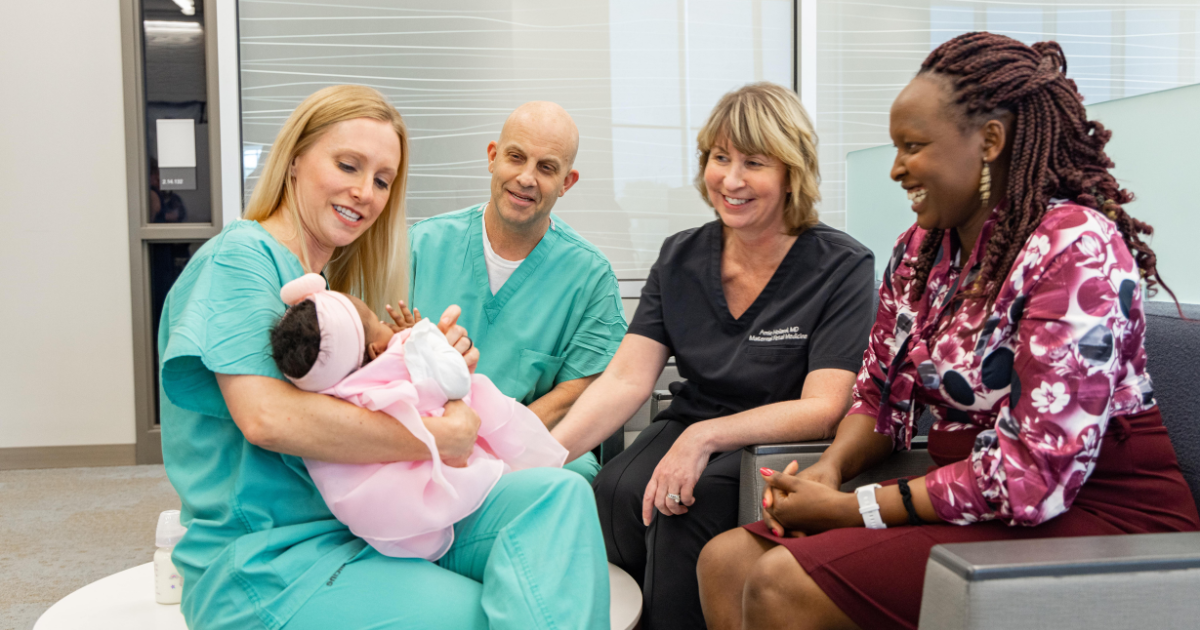A triumph of multidisciplinary care: Mother with pituitary gland tumor delivers healthy baby girl

Whenever Marion Bartilol feels down, she looks at baby Precious. And just like that, she feels better again.
Marion named her baby Precious for a very special reason. In the last trimester of her pregnancy, Marion experienced a life-threatening medical problem that required emergency surgery.
When Precious was born on April 2, it was more than a celebration of life. Marion calls it a milestone.
“Not everyone gets the gift of having a baby,” says Marion. “I did, but it was almost taken away from me. After everything I had gone through, seeing my baby for the first time was a very precious moment. So, I named her Precious.”
Marion is still dealing with the condition that led to emergency surgery during her last trimester. Several months before she became pregnant, Marion was diagnosed with a fast-growing tumor on her pituitary gland. The pituitary gland is a small organ near the base of the brain that makes several important hormones.
Marion began treatment with a drug that reduced the tumor size over the next several months and helped return her hormone levels to normal. Before she knew it, Marion was pregnant.
During her pregnancy, she was started on a different medication to suppress the tumor growth that would also be safe for her baby. Everything seemed to be going smoothly until about seven months into her pregnancy.
Marion started to notice that her vision would randomly change. A few days later, she lost her vision completely.
An MRI revealed bleeding in her brain caused by the pituitary gland tumor. The condition is called pituitary apoplexy. This occurs when the tumor grows so rapidly that it exceeds its blood supply. When this happens, a piece of the tumor tissue may die, break off and bleed. The tumor and bleeding put pressure against the optic nerves, impairing Marion’s vision. If not treated urgently, Marion could become permanently blind and experience other complications.
After doctors explained her condition, Marion was also told that the local hospital did not have the expertise to perform the needed surgery safely.
It was a difficult and emotional time. “I felt so broken and helpless,” recalls Marion. “I kept thinking, will I die and lose my baby, too? I just needed someone to say they would help me. So, we prayed.”
Then they got the news. Nebraska Medical Center agreed to take her. Emergency surgery was scheduled for 6 a.m. “The surgeon came into my room and told me there was a 50/50 chance that my vision would recover,” Marion says. “He also said they would do a cesarean section if the baby showed any distress. I was scared, but I knew this was my only chance.”
William Thorell, MD, Nebraska Medicine neurosurgeon, and Christie Barnes, MD, Nebraska Medicine otolaryngologist, were the lead surgeons for the procedure. The two are part of a specialized multidisciplinary skull-based clinic at Nebraska Medical Center that treats complex malignant and benign tumors and other conditions located near the skull base involving the brain and the nerves that encompass hearing, facial expression, vision and balance.
“While pituitary apoplexy is fairly uncommon, we have experience treating these patients,” says Dr. Thorell. “What made Marion’s case more difficult and riskier was that she was carrying a 31- week fetus. The pregnancy added additional risk, making it essential to have a full obstetric team readily available. Nebraska Medicine is fully equipped to perform complex surgery like Marion’s because of our depth of multidisciplinary specialists who are available 24/7.”
In addition to Dr. Thorell and Dr. Barnes, anesthesiologists, maternal-fetal medicine specialists, endocrine and neuro-critical care specialists were involved in the surgery and post-care.
The goal of surgery was to remove the blood clot from the area to take pressure off the optic nerve while keeping both mom and the baby stable, explains Dr. Thorell. Dr. Barnes guided an endoscope through Marion’s nose and nasal passages to the tumor to reach the affected area. With the scope in place, Dr. Barnes and Dr. Thorell could then thread tiny instruments to the area to remove the clot and a portion of the tumor. In most cases, the entire tumor would be removed. But in this case, it was left intact because Marion was pregnant.
“The pituitary gland is critical during pregnancy as it produces the hormones necessary to maintain a pregnancy and to enable breastfeeding; therefore, it could not be removed,” says Dr. Barnes. “We had to be very careful not to disturb her pituitary gland or to create any additional complications that would threaten her vision or pregnancy.”
The surgery went very well, and the baby remained stable during the entire procedure. But the true outcome would only be known once Marion awoke from surgery. When Marion opened her eyes, she was greeted by a room full of doctors and nurses. “When I told them I could see, they were ecstatic,” Marion says. “Seeing never felt so good!”
But Marion wasn’t in the clear yet. She still had nine weeks of pregnancy left. The Nebraska Medicine maternal-fetal medicine team and Nebraska Medicine endocrinologist Andjela Drincic, MD, monitored her closely.
“We evaluated Marion and her baby before surgery, and our team monitored the baby closely during the entire surgery,” says maternal-fetal medicine specialist Amie Hollard, MD. “The baby did great during and after surgery. We continued to follow them both to ensure the baby was growing well and Marion was not experiencing additional pregnancy complications.”
Marion delivered baby Precious at just over 37 weeks. Today Precious is doing great with no problems.
“I am so grateful to everyone at Nebraska Medical Center,” says Marion. “They gave me the best care. I was very emotional after surgery, but the nurses cared for me and were always there for me and my husband whenever we needed something. It was like my home away from home.”
Marion continues to take medications to shrink and suppress the tumor’s growth and is under the care of Dr. Drincic, who says her outlook is good with the proper care.
“Most of these tumors can be managed well medically if followed by a team of experts who understand these tumors well and work together to make patient-centered decisions,” says Dr. Drincic. “Our close management and monitoring can minimize tumor growth risk in subsequent pregnancies.”
“I feel good knowing I’m under the best of care, and they are doing everything possible to help,” says Marion. “They were there for me the first time, so I know they will not leave me behind now.”






